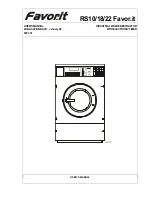
SKU 95338
PAGE 18
for technical questions, please call 1-800-444-3353;
troubleshooting section at end of manual.
InSPEctIOn, MAIntEnAncE, And clEAnIng
WARnIng!
Make sure that
1)
the Trigger is locked in its off position,
2)
the Power
Switch of the Pressure Washer is in its “OFF” position,
3)
the plug is unplugged
from its electrical outlet,
4)
that the water supply is shut off, and
5)
all residual wa-
ter pressure is safely expelled before performing any inspection, maintenance, or
cleaning procedures. Point the Wash Gun (18a) in a safe direction and discharge
all remaining pressure. Then, disconnect the garden hose from the unit.
before each use,
inspect the general condition of the Pressure Washer. Check for
loose screws, misalignment or binding of moving parts, damaged electrical wiring,
damaged High Pressure Hose, damaged accessories, and any other condition that
may affect its safe operation. If abnormal noise or vibration occurs, have the problem
corrected before further use.
do not use damaged equipment.
to clean,
remove excess water from the Pump by tipping the unit on both sides
to drain any remaining water from the inlet and outlet fittings. Drain the Detergent
Dispenser and flush with running water. Use only a clean cloth and mild detergent
to clean the body of the Pressure Washer. Do not use solvents. Remove the Inlet
Filter and run water through it backwards to remove any debris.
Do not immerse any part of the tool in liquid. Dry off any remaining water on all
parts and fittings. Then engage the Trigger Safety Lock.
Use the included Wire Tip Cleaner (32c) to help remove mineral deposits from the
nozzles. The more minerals that are dissolved in the water (the harder the water)
you use, the more often mineral buildup will need to be cleaned out from inside
nozzles.
StORAgE:
When storing, always completely empty the Pressure Washer of water.
Frost will damage the Pressure Washer if the unit contains water. Store the Pressure
Washer indoors in a dry, frost-free room. Minerals in the water can harden inside
the workings. Flush the unit with automotive antifreeze prior to long-term storage.
Always dispose of antifreeze in accord with local ordinances.
1.
2.
3.
4.
If several different surfaces are to be cleaned, be careful not to damage any of the
less solid surfaces while trying to clean the harder ones. This is especially a concern
when cleaning tile and grout, bricks and mortar, or stones and mortar.
If wood is being cleaned, be careful not to damage it. Wood will usually require
resurfacing (Sanding) and re-coat with a surface protectant (wood, stain, varnish)
after it has dried again. Try to avoid leaving water on a wooden surface; doing so
can harm the surface.
6.
.
















































